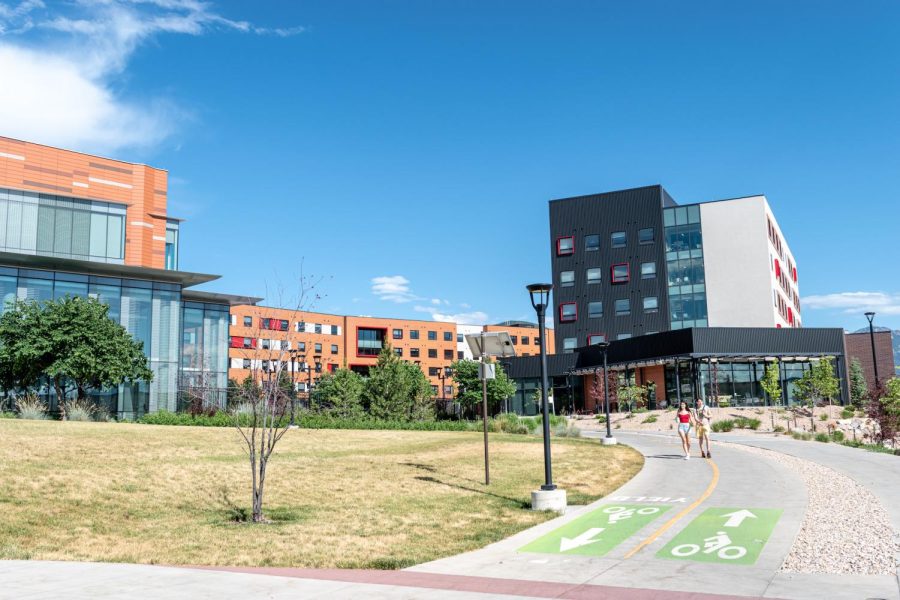JED Program at the U Unites Campus Mental Health Outreach
Students walk past the new Kahlert Village dorms and the Student Life Center in Salt Lake City on July 1, 2022. (Photo by Jack Gambassi | The Daily Utah Chronicle)
March 31, 2023
As the University of Utah’s student body has grown, so has the demand for mental health resources and support on campus. While these resources exist, the large population and expansive campus have resulted in silos, with students not always knowing what aid is available to them.
In 2020, the U started the process of becoming a JED campus, aiming to expand and improve mental health on campus by, in part, uniting the disjointed efforts already happening on campus. To accomplish this, the U is working with the JED Foundation, a national organization working to address emotional health and prevent suicide.
“The JED Campus Initiative is a nationwide initiative, really geared toward increasing and enhancing student mental health and well-being on campus,” said Dr. Lauren Weitzman, special assistant to the associate vice president for health and wellness and co-chair of the JED task force.
One of the primary ways that JED accomplishes this is by expanding the responsibility for mental health to many “campus stakeholders” and looking at mental health through a “multifaceted lens” rather than just sending everything mental health related to the counseling center, Weitzman said.
“Mental health falls on a continuum; everything doesn’t belong in the counseling center,” said Dr. Sherrá Watkins, associate vice president for student health and wellness and co-chair on the JED task force.
Watkins added that JED aims to introduce a “culture of care” throughout their campuses to improve mental health outreach.
“We use that word culture once again as an umbrella to make sure that students are able to navigate these services, these programs and policies, successfully,” Watkins said.
The U began working towards becoming a JED campus along with all the other Utah public institutions of higher education, thanks to a grant from the Marriott family that paid the fees necessary to work with the JED Foundation.
The first step was to take an inventory of the current resources and students’ mental health. This included administering the Healthy Minds Study survey to students and representatives from JED making a virtual visit to the U.
“They just looked at all that information and gave us a bunch of recommendations that go in line with their thinking and strategic plan,” Weitzman said.
Those recommendations, or JED’s “toolkit,” as Watkins referred to it, ranged broadly, but included things such as implementing breakaway closet rods in new university dorms.
Another recommendation was to have no guns on campus, but Weitzman said this was one of the suggestions they couldn’t take because it didn’t work for the U specifically.
“That’s never going to happen in Utah, sadly, in my opinion, so that’s an example of a recommendation that JED might make for us, but we’re not going to be able to do,” she said.
The University’s current policy on firearms states that they enforce state laws regulating firearms. Under Utah law, the legislature has the power to regulate firearms at higher education institutions.
After the U received all of JED’s recommendations, they created a task force — the largest JED task force in the country, according to Weitzman — that included faculty from all over the university.
“These task force members come from all walks of life, titles — doesn’t matter,” Watkins said. “We have everyone from custodial staff, everyone from campus affairs, from the student affairs side to academic affairs side.”
From there, the task force was split into seven subcommittees in charge of specific areas of campus mental health resources. They began to find out which recommendations would work for them and how to implement them at the U.
Now, the task force has begun implementing the plan they developed, though this is an ongoing process that Weitzman said will not be complete until late 2024.
“At that point, we move into what they call an alumni campus,” Weitzman said. “So that’s where we get the designation that we’ve been doing all the work [for].”
Though JED has introduced some new resources to the U, it has primarily helped “coordinate and unify” efforts that already existed so that “you as a student have a better sense of what’s going on and how you can get help,” Watkins said.
Weitzman, who graduated from the U in 1984, said becoming a JED campus now proves that more light is being shined on student mental health.
“We’re more aware of students coming to the U with depression and anxiety and needing support,” she said. “Students are much more open to getting that support.”
And as the U continues to think more and more about mental health, Watkins said JED will provide “a structure to think about that more carefully.”








